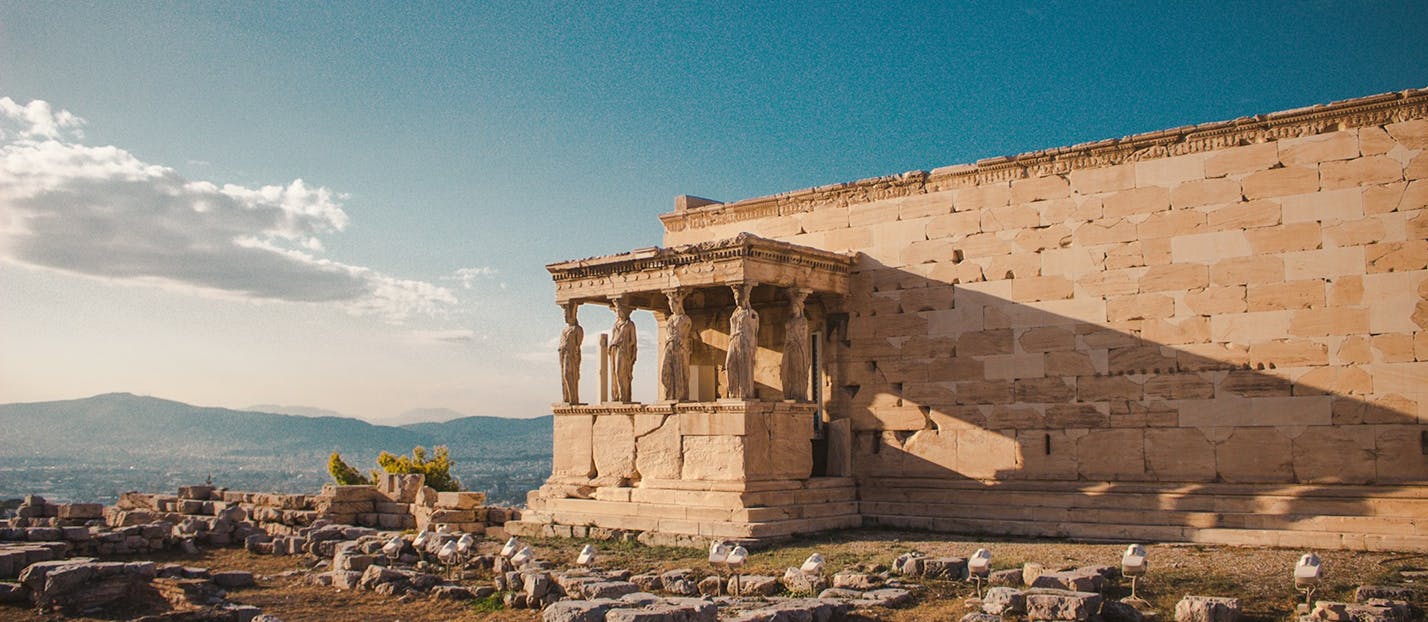
ATHENS – THE GOSPEL ADVANCE IN A PAGAN WORLD
Paul’s visit to Athens (Acts 17) was a key moment in evangelizing the pagan world. A faith journey there allows Christians to experience his message and deepen their faith through historical sites.
Walking in the Footsteps of Paul
There are a few notable events recorded in the book of Acts that set the course and give the Church of Jesus a model for evangelism and growth throughout the ages. Paul’s missionary visit to the city of Athens is one such momentous event that speaks to the life and development of every Christian community. A faith journey to Athens is a must for every Christian group traveling to Israel and to the Middle East.
For many Evangelical Christians, a pilgrimage to Israel is a deeply transformative experience. But did you know that Greece, too, holds profound biblical significance? While the Land of Israel, Judea, and the Galilee were the setting for Jesus’ earthly ministry, Greece played a significant role in the spreading of the Gospel to the Gentile pagan world. So, what can we learn while visiting Athens?
The Apostle Paul who wrote nearly two thirds of the New Testament, was one of the most influential personalities during the eventful years of the First Century A.D. It was then that the Good News of the Messiah of Israel who became the Savior of the World (a Faith which became known as “Christianity” later on), emerged from the confines of Israel and was carried globally by the Apostles.
With the Apostle Paul being the key messenger, the Good News of Messiah traveled extensively throughout Turkey and Greece, reaching Jews and Gentiles alike across the Roman Empire. Paul’s visit to Athens however, as recorded in Acts 17, was a defining moment in his missionary journeys, and a model in Church growth ever since. Consequently, a faith journey to Athens today introduces Christians to the grace and the power Paul experienced 2,000 years ago as they stand where he stood, walk where he walked, and reflect on his historic proclamation of the Gospel in a city steeped in pagan idolatry and intellectual pride.
When making your plans for your next Faith Journey to the Holy Land, consider stopping in Athens (just a short flight from Tel Aviv) for an additional inspirational experience for your group. Here, history and Scripture come alive, offering a powerful opportunity to deepen your faith and connect with the early Apostolic missionary spirit.
Athens in Paul’s Time: A City of Idols and Intellectuals
Paul arrived in Athens during the First Century A.D. after escaping persecution in the city of Berea. When he arrived, the city of Athens was a robust urban and commercial center of Greek culture, philosophy, and pagan worship. The city was embroiled in the tensions of courting Roman power while fortifying its own traditional legacy. While Rome held the political reins, Athens maintained her established position as an intellectual powerhouse and home to great thinkers like Socrates, Plato, and Aristotle. The city was rife with paganism and filled with altars, temples, and shrines dedicated to various demigods which were worshipped throughout the pagan world.
Acts 17:16 tells us that Paul’s spirit was “provoked within him” when he saw how full the city was of idols and pagan worshipers. Unlike Jerusalem, where he debated Jewish Rabbis and religious leaders in the synagogues and in the Temple, Athens presented a brand-new challenge to the Jewish Apostle. Here, Paul had to engage with Greek philosophers, scholars, and religious practitioners who had little or no knowledge or understanding at all of the God of Israel, His Word, and His purpose for mankind.
In this respect, Paul’s missionary visit to Athens became a gateway experience for him, and for the Church in the coming generations, for facing and penetrating the thick veil of deception and blindness that covers the pagan world. What can pastors, Church leaders, and Christians at large learn from that historic apostolic experience? How can we, today, implement and put into use the lessons of Act 17?

Mars Hill (Areopagus)
One of the most iconic sites for your visit in Athens is Mars Hill, also known as the historic Areopagus. This rocky outcrop that is located next to the Acropolis in the heart of Athens became known as the spot where philosophers, city leaders, and everyone who had something to say would gather to introduce and discuss new initiatives and ideas. Having spent time in discussions at the marketplace and conversations in the Jewish synagogue, Paul was eventually invited to give a formal address to the Athenian crowd on Mars Hill. It is this short and pointed message that speaks volumes to the heart of every Christian until today.
Paul’s Powerful Gospel Proclamation
In Acts 17:22-31, Paul delivers one of the most compelling presentations of the Gospel recorded in Scripture. He begins by acknowledging, some would say even honoring, the Athenians’ religious devotion, referencing an altar that he found in the city dedicated “To the Unknown God.” Using this familiar cultural and religious item as a starting point, Paul introduces them to the one true God whom they do not know, the Creator of heaven and earth. This God, Paul told them, does not dwell in man-made temples and does not need anything from us. Rather, He is the God who gives, who forgives, and who saves.
Launching from his short introduction, Paul moved directly to the heart of his message and declared to the Athenians that this God whom they do not know is “The God who made the world and everything in it, being Lord of heaven and earth, does not live in temples made by man, nor is he served by human hands, as though he needed anything, since he himself gives to all mankind life and breath and everything.” (Acts 17:24-25).
Paul’s message was radical in a city devoted to idols, pagan worship, and carnality. Without apologies, and avoiding any complex explanations, the Jewish Apostle spoke truth and challenged the Hellenistic worldview. With measured words, being no doubt aware of the limited attention span and time that his hearers would allow, Paul drove the message home.
He declared to them that God was not a distant and unknown impersonal force, but rather a personal, intimate, and Living Creator who longs for His children. Mincing no words, he called them to repentance (change of mind) while pointing them directly to Jesus, the Messiah of Israel, as the risen Savior of the whole world.
Being the first recorded apostolic message offered in such a public setting, the words of Acts 17 carry divine power and grace for people of Faith until today. Paul told the Athenian crowd, “… For in Him we live and move and have our being, as also some of your own poets have said, ‘For we are also His offspring.’ Therefore, since we are the offspring of God, we ought not to think that the Divine Nature is like gold or silver or stone, something shaped by art and man’s devising. Truly, these times of ignorance God overlooked, but now commands all men everywhere to repent, because He has appointed a day on which He will judge the world in righteousness by the Man whom He has ordained. He has given assurance of this to all by raising Him from the dead.”
The biblical text tells us that “… when they heard of the resurrection of the dead, some mocked, while others said, ’We will hear you again on this matter’ ... however, some men joined him and believed, among them Dionysius the Areopagite, a woman named Damaris, and others with them…” (Acts 17:28-34).
Paul’s message was short and to the point. The word of life was proclaimed; the hearers drew their conclusions; the remnant was gathered; and the Kingdom of God broke through. As the apostle moved on in his missionary journey the Church of Athens grew, and by the second century A.D. the Athenian Church made its mark through a line of famous and influential Christian apologists that touched the entire Christian world.
Standing With Paul
When your group visits Athens today, you can ascend Mars Hill over the ancient stone steps and stand exactly where Paul once stood, overlooking the city of Athens and the huge pagan world it reflected. Facing the sophistication, the wealth, and the power of the gods of this world, all the Jewish Apostle had in his arsenal was THE TRUTH AND THE SPIRIT OF GOD. The experience is profound, and your group members will be deeply moved as they relive this biblical moment of epic confrontation.
Imagine Paul addressing the Athenian crowd right next to the Parthenon and the temples of their gods, the powers and principalities that controlled the life and destiny of millions. Standing there today, present-day Christians will drink deep from this apostolic cup of conviction and devotion to Jesus. At Mars Hill they can reflect on their own calling to share the Gospel of Messiah in a world still filled with spiritual darkness and confusion.

The Acropolis – The Reality of the Spiritual Battle
Just above Mars Hill lies the Acropolis, the most famous archaeological site in Athens. This towering and magnificent citadel was the heart of Greek religious and civic life, featuring majestic temples dedicated to their gods. The most iconic structure is the Parthenon which was built 2,500 years ago in honor of Athena, the city’s patron goddess, after the city survived the Persian invasion.
For Paul, the sight of these impressive and grand temples must have reinforced the sense of the reality of the idols he confronted. His direct and pointed message on Mars Hill stood in stark contrast to the beliefs upheld and practiced in these temples. Visiting the Acropolis today allows Bible Believers to better grasp the cultural, spiritual, and religious climate into which the Gospel of the Lord Jesus was introduced during the First Century A.D. As Jesus Himself said, “… from the days of John the Baptist until now the kingdom of heaven suffers violence (advancing forcefully), and the violent take it by force.” (Mathew 11:12).
The Temple of Athena and the Challenge of Idolatry
The Parthenon, with its towering columns and intricate carvings, was a powerful visual reminder of Greek devotion to the goddess Athena. Paul’s message directly challenged the notion that gods could be contained in manmade temples. Standing before this archeological site today serves as a reminder that while human civilizations rise and fall, the truth of the Gospel remains immovable and unchanged from age to age.
Paul’s Marketplace Ministry - the Ancient Agora
The Agora was the city’s bustling marketplace, located beneath the Acropolis. It was the center of daily commercial life in Athens, and the heart of the social, political, and intellectual activities where ideas were exchanged and public debates took place.
Acts 17:17 tells us that Paul reasoned daily with people in the synagogue and at the Agora, engaging with Jews and Gentiles alike. The Agora was filled with philosophers, merchants, and travelers, making it an ideal place to engage open hearts and spread the Good News of the Gospel of Messiah.
As your group members stroll through the Agora ancient alleyways today, they will remember Paul’s practice of street evangelism. He took every opportunity God allowed him to engage in lively discussions, explaining the Gospel and challenging those who resisted the truth. The Stoa of Attalos, a reconstructed ancient building in the Agora, offers a realistic sense of what this vibrant marketplace looked like when the Word of God first came to Athens.
Paul’s Impact on Athens and the Early Church
Although Paul’s message at Mars Hill did not produce an immediate mass conversion, his time in Athens was fruitful. Acts 17:34 tells us that some believed, including Dionysius the Areopagite who himself was a man of renown, a member of the Areopagus council, plus a woman named Damaris and others.
Paul’s outreach in Athens included engaging the local culture, using familiar references, and pointing people directly to Messiah. These principles still serve as a model for many Churches today. His missionary visit to Athens was part of a larger campaign that, over time, established the Christian Faith firmly throughout the Greek world and the Roman Empire.
Paul’s experience in Athens holds powerful lessons for Christians today. Like the ancient Greeks, our modern world is filled with competing philosophies, false beliefs, and spiritual idolatry. Paul’s direct approach and boldness in sharing the Gospel while engaging different worldviews, are an inspiration for Christians today.
As visitors walk through Athens, they are reminded that the same Gospel Paul preached then, continues to transform lives today. Standing on Mars Hill or walking through the ancient Agora marketplace, modern Bible Believers can reflect on their own call in spreading the message of Jesus the Savior.
Continuing Paul’s Journey in Greece
For evangelical visitors and groups eager to follow Paul’s footsteps, Greece offers a rich tapestry of biblical history waiting to be explored. A visit to Athens is just the beginning of a biblical tour of Greece, and other key destinations include:
- Corinth – Where Paul spent 18 months preaching and writing.
- Thessaloniki – A city that received two of Paul’s New Testament letters.
- Philippi – The site of Paul’s imprisonment and the conversion of Lydia.
Get In Touch

Plan Your Faith Journey to Athens and Greece with Sar-El Tours today.
At Sar-El Tours, we specialize in faith-based travel, curating unforgettable journeys that bring the Bible to life. Whether you want to visit Mars Hill, explore Corinth, or follow Paul’s footsteps across Greece, we are here to help you design and plan a transformative pilgrimage for you and for your group.
Contact Sar-El Tours today to start planning your journey of faith through Greece. Let the biblical heritage of the book of Acts strengthen your faith and ignite your passion for the Gospel!
